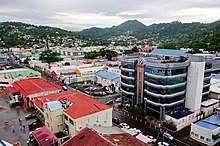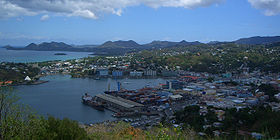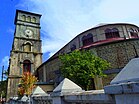Our website is made possible by displaying online advertisements to our visitors.
Please consider supporting us by disabling your ad blocker.
Castries
This article needs additional citations for verification. (June 2010) |
Castries | |
|---|---|
|
Top: View of Castries; Middle: Cathedral Basilica of the Immaculate Conception, Castries Harbour; Downtown Castries, Saint Lucia Government House | |
| Motto: Statio Haud Malefida Carinis ("A Safe Harbour for Ships")[1] | |
 The District of Castries, showing Castries city (red dot) | |
| Coordinates: 14°01′N 60°59′W / 14.017°N 60.983°W | |
| Country | |
| District | Castries District |
| Founded | 1650 as "Carenage" |
| Renamed | 1756 as "Castries" |
| Founded by | the French |
| Named for | Charles Eugène Gabriel de La Croix, marquis de Castries |
| Government | |
| • Governing body | Castries City Council |
| • Mayor | Geraldine Lendor-Gabriel |
| Area | |
• Total | 79 km2 (30.5 sq mi) |
| Elevation | 2 m (6.56 ft) |
| Population (2013) | |
• Total | 20,000 |
| • Density | 250/km2 (660/sq mi) |
| Time zone | UTC-4 (Eastern Caribbean Time Zone (ECT)) |
| Area code | 758 |
| Website | www |

Castries (/kəˈstriːz/ ⓘ) is the capital and largest city of Saint Lucia, an island country in the Caribbean. The urban area has a population of approximately 20,000, while the eponymous district has a population of just under 70,000, as at May 2013. The city covers 80 km2 (31 sq mi).[4][5][6]
Castries is on a flood plain and is built on reclaimed land. It houses the seat of government and the head offices of many foreign and local businesses. The city is laid out in a grid pattern. Its sheltered harbour receives cargo vessels, ferries and cruise ships. It houses duty-free shopping facilities such as Point Seraphine and La Place Carenage.
Castries is the birthplace of Arthur Lewis, winner of the 1979 Nobel Memorial Prize in Economics, as well as of Derek Walcott, winner of the 1992 Nobel Prize for Literature.
- ^ "Castries City Council - St Lucia". Archived from the original on 2009-09-28. Retrieved 2009-07-29.
- ^ "Weather in Castries. Current weather | lc.freemeteo.com". Freemeteo.com. Retrieved 2016-08-10.
- ^ "St Lucia Travel Guide and Travel Information". Worldtravelguide.net. Archived from the original on 2010-06-08. Retrieved 2016-08-10.
- ^ "Castries". GeoNames. Retrieved August 12, 2021.
- ^ "Map of Castries" (PDF). The Central Statistical Office of Saint Lucia. Archived from the original on August 13, 2021. Retrieved August 17, 2021.
- ^ Law, Gwillim (2015). "Districts of Saint Lucia". Statoids. Retrieved August 10, 2021.
Previous Page Next Page









